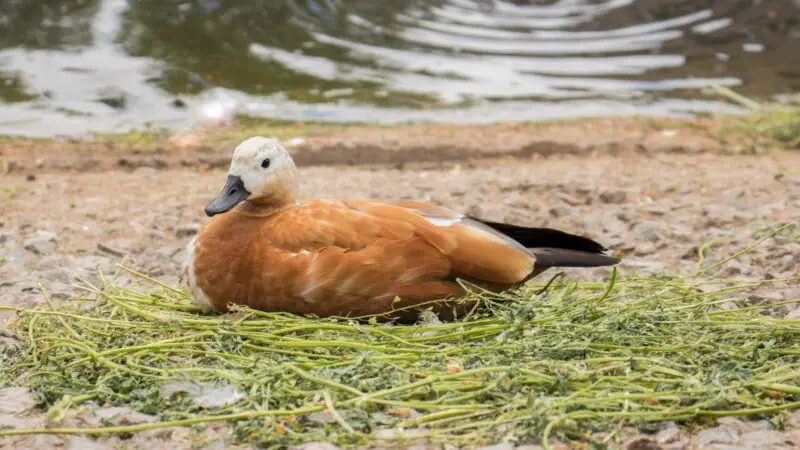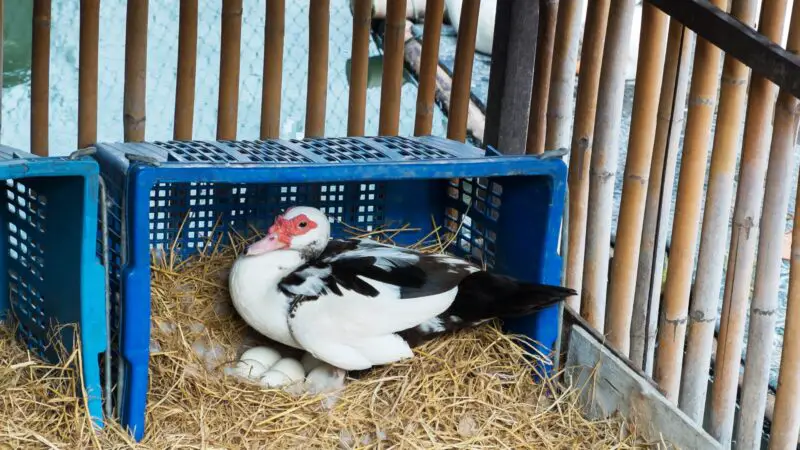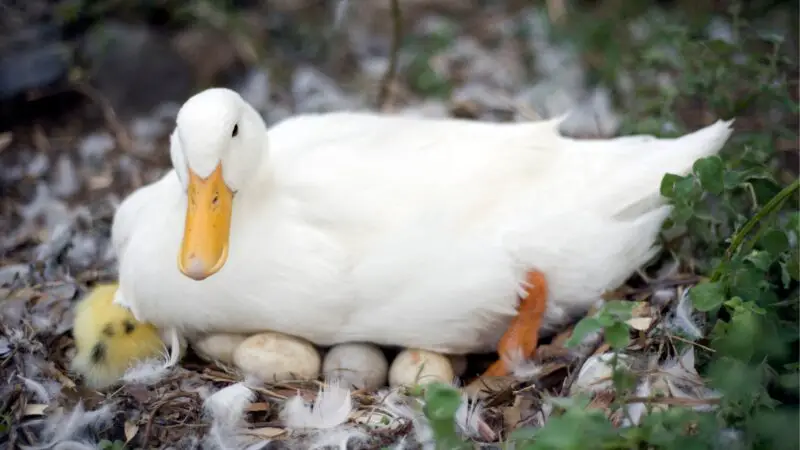Ducks are naturally good mothers, whether they are in the wild or on a farm. They go through a stage called “broody” where they love to sit on eggs instead of laying them.
If you want to have many ducklings, this broodiness behavior can be an advantage. However, it can also be challenging to determine whether the eggs are still alive or have already died.
Ducks do not mourn over their dead eggs, as they are unable to determine whether an egg is dead or not while they are broody. However, ducks may mourn the loss of their ducklings, as they have already formed a bond with them. They may also grieve the loss of a partner, but will eventually move on.
Broody ducks are ducks that love to sit on eggs. This natural hatching method of duck eggs is equivalent to placing the eggs inside an incubator until they hatch. If you don’t have an incubator, you have no choice but to rely on mother ducks.
This article will provide information on broody ducks and how to determine whether duck eggs are dead or alive.
Will a Duck Sit on Dead Eggs?

If a mother duck is broody, she will continue to sit on her eggs even if they are dead. If you remove the eggs from the nest while the mother is broody, she may defend the eggs and assume that they are still alive.
In fact, they will also sit on unfertilized eggs since they cannot identify the difference between fertilized eggs and those that are not.
How Long Will a Duck Sit on Dead Eggs?
A duck will sit on dead eggs for at least 28 days, which is the usual incubation period for duck eggs. As mentioned earlier, ducks have no way of knowing if their eggs are dead or not.
Hence, they will continue sitting on dead eggs unless you remove them. So, if you are sure that the eggs are dead, remove them from the nest as soon as possible.
Do Ducks Know If Their Eggs Are Dead?
Technically, ducks will not know if their eggs are already dead. They also cannot sense if an egg is fertilized or not. This is why as a duck farmer; you should know how to check the status of their eggs.
But in most cases, broody ducks will attack you if you try to get their eggs. Getting their eggs from the nest may also break their broodiness.
Why Do Ducks Sit on Dead Eggs?

Ducks sit on dead eggs simply because they don’t know that their eggs are already dead. Their maternal instinct tells them that they should sit on eggs until they are hatched.
Since they are likely to attack you if you try to get their dead eggs, get them while they are away or wear protective clothing. Then, block the nest so they can no longer enter.
How to Tell If Duck Eggs Are Dead?
The most common and effective way to check if duck eggs are already dead or still alive is by performing the candling method. Note, however, that the duck eggs should be more than seven days inside an incubator before candling them.
Otherwise, the result can be inaccurate. Below are the simple procedures for candling a duck egg correctly:
- Prepare the duck eggs in a room, as well as a light source. It can be a candle, flashlight, or small lamp.
- Turn off all the lights in the room. Make sure that the room is entirely dark.
- Hold a duck egg with the top side (pointed side) facing upwards.
- Hold the light source above the top of the egg. Hold it around its end so that the light will not bounce back to your eyes. Also, make sure that the light enters the egg.
- If you see some clear distinct veins on the embryo, the duck egg is most likely alive. Otherwise, it is already dead.
- On day 12 of incubation, the embryo will likely move once the light is directed toward the egg. If the embryo did not move and there are streaks of blood within the egg, the embryo is most likely dead.
What Happens to Duck Eggs That Don’t Hatch?
If a duck egg did not hatch, it only means that the embryo inside has died. As for fertilized duck eggs, there are several reasons why they don’t hatch. This includes improper incubation or inconsistent sitting of broody ducks, bacteria have entered the egg, or the eggs having poor quality. But if the egg is not fertilized, the embryo will not develop at all.
Do Ducks Eat Their Own Eggs?

Ducks do eat their own eggs. If their nests are too small for the eggs, the ducks may accidentally break some eggs and eat them.
Egg-eating is also possible if your ducks lack calcium. Eggshells are about 40% calcium, and ducks need calcium to have stronger shells for their eggs. This bad habit is more common in chickens, though.
Is It Illegal to Take Migratory Duck Eggs?
It is illegal to take migratory duck eggs without securing a permit first from the United States Fish and Wildlife Service (FWS). Ducks from the wild are included in the list of migratory birds that are protected by US law and international treaties. This long list contains 1,093 different species of migratory birds and was last updated in May 2020.
The Migratory Bird Treaty Act of 1918 (MBTA) clearly states that “It shall be unlawful at any time, by any means or in any manner, to pursue, hunt, take, capture, kill, attempt to take, capture, or kill, possess, offer for sale, sell, offer to barter, barter, offer to purchase, purchase, deliver for shipment, ship, export, import, cause to be shipped, exported, or imported, deliver for transportation, transport or cause to be transported, carry or cause to be carried, or receive for shipment, transportation, carriage, or export, any migratory bird, any part, nest, or egg of any such bird, or any product, whether or not manufactured, which consists, or is composed in whole or part, of any such bird or any part, nest, or egg.”
Misdemeanor offenders of the said law shall be fined a maximum of $5,000 and/or imprisoned for not more than 6 months for individuals or a $10,000 fine for an organization. Meanwhile, felony offenders shall be fined $250,000 maximum and/or imprisoned for not more than 2 years for an individual or $100,000 for an organization.
Do Wild Ducks Nest in Your Backyard?

Wild ducks may nest in your backyard, especially if it has vegetation and open water. Also called mallards, wild ducks usually build their nests between April and May and will breed by the start of August.
If you have a pool, they are also likely to nest about 100 feet away from it. Mallards may lay eggs 1-3 days after building their nest.
How Long Does It Take for a Duck Egg to Hatch?
On average, it takes 28 days before a duck egg hatches. This is common for most duck breeds, such as Pekin ducks.
However, eggs from a few breeds, such as Muscovy ducks, may take about 35 days to hatch. Duck eggs can be hatched in two ways – by a broody duck sitting on the eggs or by placing them inside an incubator at a certain temperature.
Do Ducks Sit on Their Eggs All Day?
Broody ducks sit on their eggs all day except when it’s time to eat, drink, or poop. Amazingly, these dedicated mothers spend 20-23 hours a day sitting on their eggs until they hatch.
They only leave the nest about three times, with about an hour at a time. But before leaving, mother ducks cover their eggs with nesting material to keep them warm.
Do Mother Ducks Abandon Their Eggs?
Mother ducks don’t abandon their eggs in general. If you find a duck nest with eggs, leave it alone and don’t disturb the eggs.
Chances are the mother duck is just around finding food or water, and she will return after about an hour. Note also that embryos will not start to develop unless ducks sit on the eggs or you place them inside an incubator.
Aside from that, mallards usually lay 12-13 eggs and don’t sit on them unless all of them are laid. Therefore, finding a duck nest with 4-5 eggs without the mother does not necessarily mean that she has already abandoned her eggs. But then, once the mother duck realizes that her eggs are no longer viable, she will eventually leave them.
Why Did My Duck Stop Sitting on Her Eggs?
Generally speaking, ducks will not stop sitting on their eggs unless there is a valid reason. If the eggs are viable and the mother duck still left them, there are several reasons why they lose their appetite while sitting on them. This includes disturbance from the environment, the presence of drakes (male ducks) or predators, and their hormones.
Ducks have prolactin hormones that cause them to go broody. The higher the level of prolactin the duck has, the greater the chance that she will go broody.
On the other hand, ducks that have a decreased level of prolactin have a greater tendency of losing their broodiness. This phenomenon is usually hereditary and is quite unpredictable.
How Long Can Eggs Survive Without Incubation?
A power outage can happen during egg incubation. The length of time that eggs can survive without incubation depends on the temperature.
Once the incubator temperature is 70°F (21.1°C) or below, the embryo may only survive for a very short time. If the incubator temperature is 90°F (32.2°C), the embryo can survive for up to 18 hours.
Ideally, duck eggs should be incubated, or a broody hen sits on them within 1-3 days after they are laid. Otherwise, the embryo inside may not develop well.
If the eggs are stored at about 55°F (13°C) for 7 days before incubation, the hatchability rate will be reduced by 3%. Meanwhile, eggs that are stored for 14 days will have about a 10% loss.
Related: All About Duck Eggs | Are Duck Eggs Healthy to Eat?
List of Sources
Migratory Bird Treaty Act of 1918
